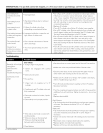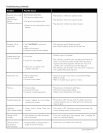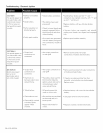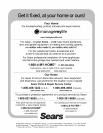Special offers from our partners!

Find Replacement BBQ Parts for 20,308 Models. Repair your BBQ today.
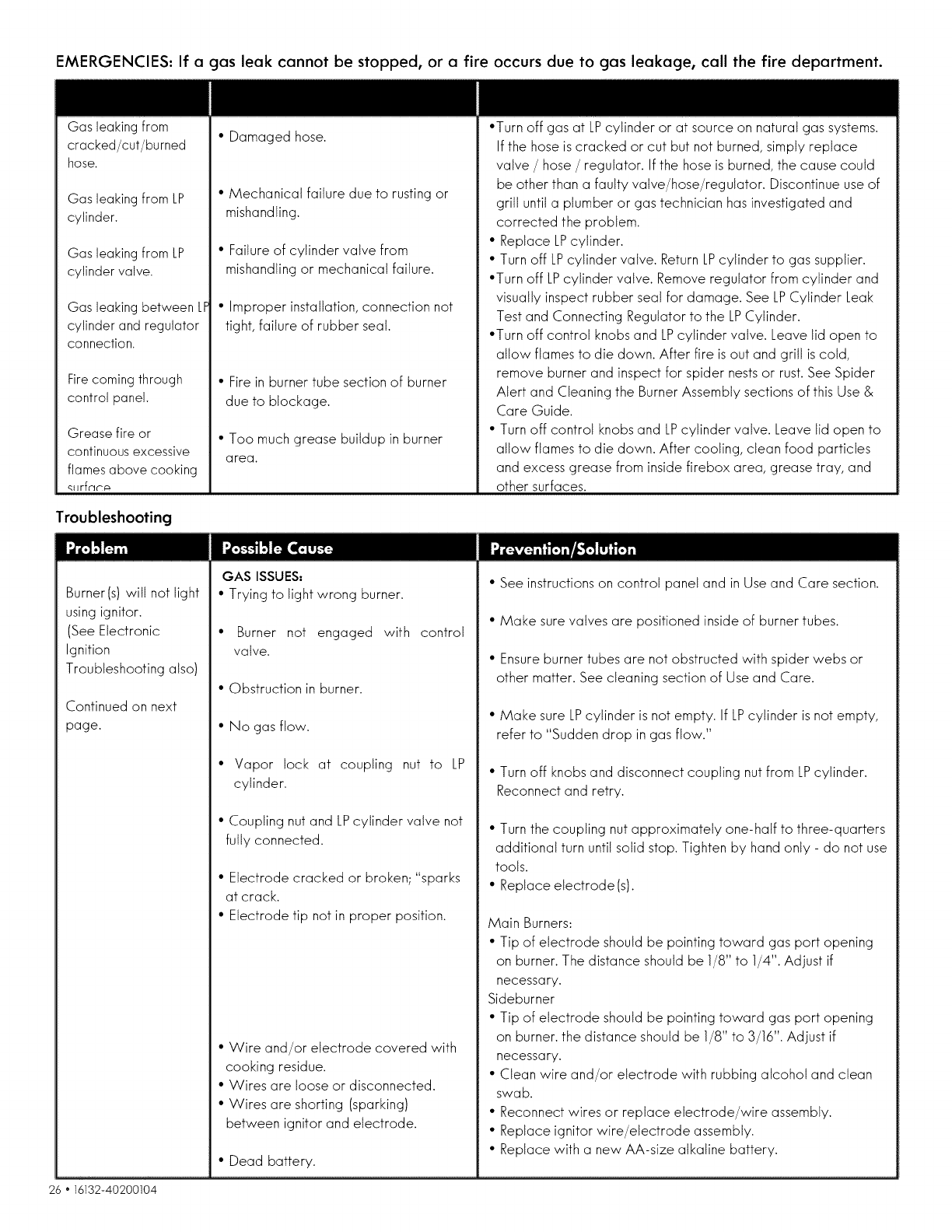
EMERGENCIES: If a gas leak cannot be stopped, or a fire occurs due to gas leakage, call the fire department.
Gas leaking from
cracked/cut/burned
hose
Gas leaking from LP
cylinder
Gas leaking from LP
cylinder valve
Gas leaking between LF
cylinder and regulator
connection
Fire coming through
control panel
Grease fire or
continuous excessive
flames above cooking
q_Jrfn¢'_
Troubleshooting
• Damaged hose
• Mechanical failure due to rusting or
mishandling
• Failure of cylinder valve from
mishandling or mechanical failure
• Improper installation, connection not
tight, failure of rubber seat
• Fire in burner tube section of burner
due to blockage
• Too much grease buildup in burner
area
•Turn off gas at LPcylinder or at source on natural gas systems
If the hose is cracked or cut but not burned, simply replace
valve / hose / regulator If the hose is burned, the cause could
be other than a faulty valve/hose/regulator Discontinue use of
grill until a plumber or gas technician has investigated and
corrected the problem
• Replace LPcylinder
• Turn off LPcylinder valve Return LPcylinder to gas supplier
•Turn off LPcylinder valve Remove regulator from cylinder and
visually inspect rubber seat for damage See LPCylinder Leak
Test and Connecting Regulator to the LPCylinder
•Turn off control knobs and LPcylinder valve Leave Iid open to
allow flames to die down After fire is out and grill is cold,
remove burner and inspect for spider nests or rust See Spider
Alert and Cleaning the Burner Assembly sections of this Use &
Care Guide
• Turn off control knobs and LPcylinder valve Leave lid open to
allow flames to die down After cooling, clean food particles
and excess grease from inside firebox area, grease tray, and
other surfaces
Burner(s)will not light
usingignitor
(SeeElectronic
Ignition
Troubleshootingalso)
Continued on next
page
GAS ISSUES:
• Trying to light wrong burner.
• Burner not engaged with control
valve
• Obstruction in burner
• No gas ftow
• Vapor Iock at coupling nut to LP
cylinder
• Coupling nut and LPcylinder valve not
fully connected
• Electrode cracked or broken; "sparks
at crack
• Electrode tip not in proper position
• Wire and/or electrode covered with
cooking residue
• Wires are loose or disconnected
• Wires are shorting (sparking)
between ignitor and electrode
• Dead battery
• See instructions on control panel and in Use and Care section
• Make sure valves are positioned inside of burner tubes
• Ensure burner tubes are not obstructed with spider webs or
other matter See cleaning section of Use and Care
• Make sure LPcylinder is not empty If LPcylinder is not empty,
refer to "Sudden drop in gas flow"
• Turn off knobs and disconnect coupling nut from LPcylinder
Reconnect and retry
• Turn the coupling nut approximately one half to threequarters
additional turn until solid stop Tighten by hand onty do not use
tools
• Replace electrode (s)
Main Burners:
• Tip of electrode should be pointing toward gas port opening
on burner The distance should be 1/8" to 1/4" Adjust if
necessary
Sideburner
• Tip of electrode should be pointing toward gas port opening
on burner the distance should be 1/8" to 3/16" Adjust if
necessary
• Clean wire and/or electrode with rubbing alcohol and clean
swab.
• Reconnect wires or replace electrode/wire assembly
• Replace ignitor wire/electrode assembly
• Replace with a new AA size alkaline battery
26 • 16132-40200104












